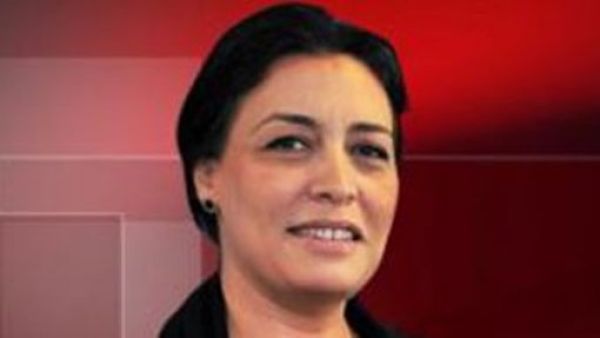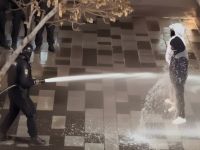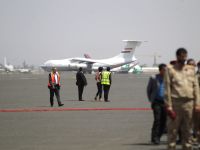Two television channels aired audio comments on Tuesday from women they said were the Syrian ambassador in Paris but the contradictory comments they made left it unclear whether one of the broadcasts was a hoax or whether the diplomat had had a change of heart.
France 24 broadcast what it said was Syrian envoy Lamia Chakkour saying in French that she resigned in protest at the Syrian government's crackdown on protest. But Al Arabiya TV aired a woman -- whose voice sounded rather different -- saying, in Arabic, that she was Mrs. Chakkour and had not quit.
Reuters had checked with the Syrian embassy in Paris before reporting the initial resignation statement aired on France 24. An e-mail response from the embassy, sent via its Website, confirmed that ambassador Chakkour had resigned. However, Syrian state media quickly reported that this was not the case. And Al Arabiya aired angry comments in Arabic from a woman, who said she was the ambassador and denied ever speaking to France 24 or giving up her post.
“I have not talked to any channel anywhere in the world,” she said. “I am very angry.”
An editor at France 24 said he was familiar with Mrs. Chakkour and that the channel stood by the comments which it broadcast. Deputy editorial director Renee Kaplan told Reuters she had complete confidence in the identity of Mrs. Chakkour, who she said the station called on a number it has often used to reach her.
The news about Mrs. Chakkour came as Western powers on Tuesday were putting together a draft UN Security Council resolution condemning Syria’s crackdown on opposition protests.
France, Britain and the United States were considering pressing for a vote by the 15-member Security Council on the resolution, even though China and Russia remained opposed.
Foreign Minister Alain Juppe of France, on a visit to Washington, said of the 15-member UN Security Council: “We think that it will be possible to get eleven votes in favor of the resolution and we’ll see what the Russians will do.”
The draft was drawn up by France, Britain, Germany and Portugal. It condemns violence at the hands of the regime of Syrian President Bashar Al Assad and asks him to open Syrian cities to humanitarian teams, according to Agence-France Presse.
The five permanent council member countries—Russia, Britain, France, the United States and China—have veto power.
Speaking in English at the Brookings Institute, Mr. Juppe told diplomats and analysts that “if they veto, they will take their responsibility.”
“Maybe if they see that there are eleven votes in favor of the resolution, they will change their mind. So there is a risk to take, and we're ready to take it,” Mr. Juppe stressed, noting that he had discussed the situation with Secretary of State Hillary Rodham Clinton of the United States.
“We know that Russia probably would veto any resolution about Syria, even a mild one as is the text that we are proposing with the British and the Americans,” Mr. Juppe said.
Syrian forces, meanwhile, fought gunmen in battles that left more than 120 members of the security forces dead, state television said in the first report of large-scale armed clashes in the revolt against President Assad.
Television reports said armed groups set government buildings ablaze in the northwestern town of Jisr Al Shughour, stole five tons of dynamite and were firing at civilians and security forces with machineguns and rocket-propelled grenades, according to Reuters.
“The security forces have managed to end a blockade of one of the neighborhoods that was seized by the gunmen for awhile and are now battling them to end the blockade of the other neighborhoods,” the reports said.
“The gunmen mutilated some of the bodies and threw some into the river. The people in Jisr Al Shughour are urging the army to intervene speedily,” the reports said.
Opposition activists earlier said a security operation had been under way in the town since Saturday in which they said at least 37 residents and 10 police had been killed.
But it was impossible to verify the conflicting accounts of the violence from activists and officials as authorities have prevented most international media from operating in Syria.
Interior Minister Mohammad Ibrahim Al Shaar said authorities would respond firmly to armed attacks and Information Minister Adnan Mahmoud said the army, which has so far stayed out of the town, “will carry out their national duty to restore security.”
Rights groups say 1,000 civilians have been killed in the protests which have swept from the southern city of Deraa to the Mediterranean coast and eastern Kurdish regions.
But the ferocity of the crackdown could increase further if the government comes up against an armed insurrection.
Syrian forces crushed an armed Islamist uprising in the city of Hama in 1982 on the orders of Bashar’s father, the late President Hafez Al Assad, killing up to 30,000 people.
An activist told Reuters that police and members of the security forces in Jisr Al Shughour were killed by gunmen.
“Some people in some areas have taken up arms,” he said.
“The situation is grave, what is happening is an armed rebellion. I oppose violence from whatever side it comes from.”
Residents said violence erupted in Jisr Al Shughour on Saturday when snipers on the roof of the main post office fired at a funeral for six protesters killed the day before.
Angry mourners set fire to the post office, a history teacher in the town called Ahmad said. State television said eight members of the security forces were killed when armed gunmen attacked the post office building.
It said at least 20 security force members were killed in an ambush by “armed gangs,” and 82 were killed in an attack on a security post. It said the overall death toll for security forces was more than 120.
A rebellion in Jisr Al Shughour was crushed by Bashar’s father in 1980 with scores of deaths.
Mr. Assad, 46, has sent in tanks to crush demonstrations in certain flashpoints.
He also has made some reformist gestures, such as issuing a general amnesty to political prisoners and launching national dialogue, but protesters and opposition figures have dismissed such measures.
By Sara Ghasemilee








